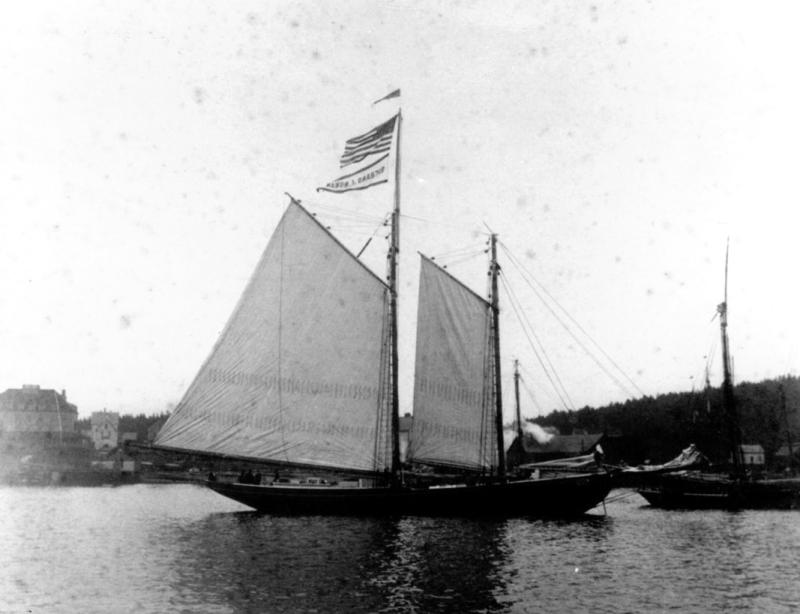There was a lot more informal joking around in the Boothbay Register in the late 1800s. Jokes and puzzles took up at least half a column. A fairly funny, short August 1877 tall tale dealt with shingling the fog at West harbor. One-liners and puns, “The great senses taker—rum,” filled awkward spaces. By 1879 jokes and puzzles generally vanished. Before then, some seemingly solemn obituaries were amusing entries in the late 1800s local paper. One of them, for the 74-foot schooner, Celestia, appeared in the May 3, 1879 Register.
The Celestia
“Died in Boothbay, April 12, 1879, Schooner Celestia, aged 39 years. The Celestia was born of rich but respectable parents in Middletown, Connecticut in 1849, where she lived a sober and industrious life until 1872, when she moved to Boothbay, where her health gradually declined, so that for the last six months she has not left her bed. But we did not think her end so near until a few days since the woodman’s axe was heard cutting down her masts, which fell with a crash, and that old schooner was no longer among the living.
Her character stands without a stain. She not only supported herself, but every year of her life contributed toward the support of the family with which she was connected, and although sometimes called “an old soaker,” yet she never took anything but cold water. And like Washington with his hatchet, she never told a lie. Peace to her memory.”
Hero the Horse
The ice companies of the late 1800s and early 1900s needed horse power. The horses are most remembered for their work on the pond ice, since those jobs were more unusual than hauling loads of hay or sawdust to keep the ice houses insulated. On the pond, the teams cleared the ice of snow and debris to get to good hard ice, and they scored the ice by pulling heavy metal six-foot ice groovers to prepare an icy grid for the men to saw. The Knickerbocker, a New York outfit with its Boothbay branch dating to 1877, was one of the big ice companies, located on the Knickerbocker Ponds and on Barters Island. The Knickerbocker iceworks maintained stables and could keep as many as 30 teams busy.
On February 2, 1878, the Register recorded that, “On January 29, died at the stables of the Knickerbocker Ice Company, a very valuable horse. He very calmly passed away surrounded by a large circle of mourning friends. Burial Wednesday, served by Gilman Stover, R.H.M.” Rest His Memory? or Right Hand Man?) Accompanying the announcement was the below short poem:
Noble Hero thou hast passed away,
Age had brought thee to thy tomb;
Many friends would wish thee stay,
But death has called thee none too soon.”
Jimpsy the Cat
This third submission in the unlikely obits category makes the jump into the 20th century. The Register ran the following in January 1933: “Jimpsy, one of the oldest cats ever known in this region, passed away last week at the good old age of 21 years. Jimpsy was a famous mouser in his time, but for several years back, he had been incapacitated by the loss of some of his faculties. For several years he had not been seen or heard, but in general his health remained good until the day of his death. Jimpsy really lived to a remarkable age for a cat, authenticated by his owner, Alice M. Hill of School Street, in whose family he had been all his life.” Alice Hill was the long time telegraph operator in town.
And Not So Dead
Obits for people did not take their modern form until about the 1920s. Only very well-known townspeople received what we regard as an obit before then. Ordinarily, a pre-1920s death got a short notice and a remark in the neighborhood column. Usually the remarks took the form of describing in detail the stoic silence of the deceased in the face of great pain and suffering before death.
In a twist, on November 2, 1889, the Register reported, “Captain Mitchell Brewer is quite sick. Take care, old friend and veteran, the storms of sea and battle have beat upon your head for many years and whitened it almost for harvest. Be ready for the roll call.”
The following week Mitch Brewer was declared no better; the week after, there was no mention of him at all. Finally the November 23 issue reported, “We are glad to learn that Captain Mitchell Brewer is gaining nicely and will soon be out again.” Mitch Brewer, born in 1815, was a Civil War Vet who’d served on the USS Alabama, catching blockade runners and Confederate raiders. He lived on until Christmas 1895, another six years after his premature “Prepare for the end” lecture. I like to think he revived to spite Charles Kendrick, the editor of the paper, who had announced his impending death a little early.
























